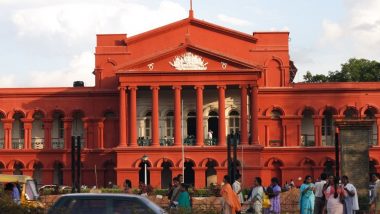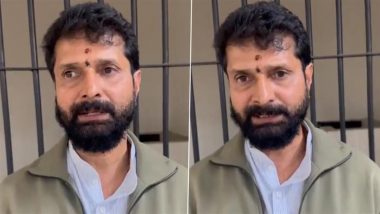Bengaluru, July 20: The Karnataka High Court has held that Article 25 of the Indian constitution, which guarantees religious freedom, cannot be invoked to protect illegal religious structures, Live Law reported. A division bench comprising Chief Justice Abhay S Oka and Justice M Nagaprasanna made the observation while considering a writ petition highlighting the failure of Bruhat Bengaluru Mahanagara Palike (BBMP) to demolish an unauthorized temple built on a footpath. 'Unbecoming of Indian Woman to Sleep After Being Ravished', Says Karnataka High Court While Granting Anticipatory Bail to Rape Accused.
"The fundamental right under Article 25 of the Constitution of India does not extend to offering worship or prayers at each and every place. Surely, the fundamental right under Article 25 of the Constitution of India cannot be invoked for protecting an illegal structure of a temple which is on a footpath," the Karnataka High Court said. It further said an authorised religious structure cannot be protected under Article 25. Karnataka High Court Stays State Government's Ban Imposed on Conducting Online Classes Upto Class 10th.
"The right to construct unauthorized temples and that also on a footpath cannot be said to be an essential part of any religion or religious practice which can be protected under Article 25 of the Constitution of India," the two-judge bench held. It came down heavily on a Residents Welfare Association (RWA), which intervened in the writ petition seeking to protect the temple, saying they want to protect "illegality".
The duty of the citizens is to see that no illegal structure and especially, illegal religious structure comes up in their locality. But they want to protect a temple which has come up on a footpath. If the intention of the applicants was really bona fide, long back, they could have applied for relocation of the temple from the footpath. But their intention appears to be to protect the illegality," the bench said.
"We do not think that any god or religion will support an illegal religious structure which is on a footpath. A religious structure cannot become an obstacle on a footpath which is meant for walking," it added. The next hearing on the petition will take place on July 30.
(The above story first appeared on LatestLY on Jul 20, 2020 09:16 AM IST. For more news and updates on politics, world, sports, entertainment and lifestyle, log on to our website latestly.com).













 Quickly
Quickly




















